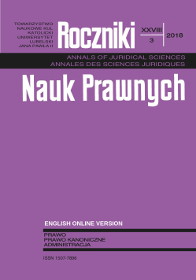Legal Requirements for Pious Dispositions of Will According to the 1983 Code of Canon Law
Abstract
The article examines legal regulations concerning pious dispositions of will contained in the 1983 Code of Canon Law. The research problem, that is, identification of the legal requirements for a lawful acceptance of pious will, indicates that anyone can effect voluntary dispositions of property for pious causes (c. 1299, §1), if he has the capacity to perform acts in law, subject to canon 668, §5. The legislator distinguishes three ways of disposing of property for pious causes: inter vivos (e.g. by a donation agreement), 2. mortis causa (e.g. by a will and testament, a testamentary legacy, or legatum), and 3. through trust for pious causes (c. 1302). In adopting pious dispositions of will, not only canon law, but also civil law should be respected, without prejudice to the supervisory authority of the ordinary bishop expressed in canon 1301, §§1 and 3; canon 1302, §§1 and 2, and canon 1304.
References
Bączkowicz, Franciszek, Józef Baron, and Władysław Stawinoga. Prawo kanoniczne. Podręcznik dla duchowieństwa. Vol. 2. Opole: Wydawnictwo Diecezjalne św. Krzyża, 1958.
Bouscaren, Timothy L., Adam Ch. Ellis, and Francis N. Korth. Canon Law. A Text and Commentary. Milwaukee: Bruce Publishing Co, 1963.
Chiappetta, Luigi. Il Codice di Diritto Canonico. Vol. 2. Bologna: EDB, 2011.
Codex Iuris Canonici. Kodeks Prawa Kanonicznego. Komentarz. Powszechne i partykularne ustawodawstwo Kościoła katolickiego. Podstawowe akty polskiego prawa wyznaniowego. Edited by Piotr Majer. Polish edition based on Spanish edition. Kraków: Wolters Kluwer Polska, 2011.
De Paolis, Velasio. De bonis Ecclesiae temporalibus. Adnotationes in Codicem. Liber V. Rome: Gregorian University, 1986.
De Paolis, Velasio. I beni temporali della Chiesa. New edition, revised and consolidated by Alberto Perlasca. Bologna: EDB, 2016.
De Paolis, Velasio. Il Codice del Vaticano II. I Beni temporali della Chiesa. Bologna: Edizioni Dehoniane, 2001.
Domaszk, Arkadiusz. Dobra doczesne Kościoła. Warsaw: Wydawnictwo UKSW, 2016.
Falchi, Francesco. “Le pie volontà.” In AA. VV. I Beni temporali della Chiesa, 163–223. Vatican City: Libreria Editrice Vaticana, 1999.
Gałkowski, Tomasz. “Pobożny zapis i pobożna fundacja.” Prawo Kanoniczne 52, nos. 3–4 (2009): 317–35.
Grabowski, Ignacy. Prawo kanoniczne według nowego Kodeksu. Lviv Towarzystwo Biblioteka Religijna, 1927.
Jezioro, Julian. “Darowizna.” In Kodeks cywilny. Komentarz, 8th ed., edited by Edward Gniewek and Piotr Machnikowski, 1634. Warszawa: Wydawnictwo C.H. Beck, 2017.
Kaleta, Paweł. Kościelne prawo majątkowe. Lublin: Towarzystwo Naukowe KUL, 2014.
Kaleta, Paweł. Prawne aspekty zarządzania dobrami doczesnymi Kościoła. Lublin: Wydawnictwo KUL, 2017.
Kennedy, Robert. “The Temporal Goods of the Church.” In New Commentary on the Code of Canon Law, edited by John P. Beal, James A. Coriden, Thomas J. Green, 1449–1525. Mahwah–New York: Paulist Press, 2000.
Kuźmicka-Sulikowska, Joanna. “Pojęcie testamentu.” In Kodeks cywilny. Komentarz, 8th ed., edited by Edward Gniewek and Piotr Machnikowski, 1803. Warszawa: Wydawnictwo C.H. Beck, 2017.
López Alarcón, Marian. “Dobra doczesne Kościoła.” In Codex Iuris Canonici. Kodeks Prawa Kanonicznego. Komentarz. Powszechne i partykularne ustawodawstwo Kościoła katolickiego. Podstawowe akty polskiego prawa wyznaniowego, edited by Piotr Majer, 929–82. Polish edition based on Spanish edition. Kraków: Wolters Kluwer Polska, 2011.
Morrisey, Francis G. “The Temporal Goods of the Church.” In The Canon Law. Letter & Spirit. A Practical Guide to the Code of Canon Law, edited by Gerard Sheehy, Francis G. Morrisey, Canon Law Society of Great Britain and Ireland, Canadian Canon Law Society, and Catholic Church, 707–47. Liturgical Press, 1995.
Pawluk, Tadeusz. Prawo kanoniczne według Kodeksu Jana Pawła II. Vol. 4, Dobra doczesne Kościoła. Sankcje w Kościele. Procesy. Olsztyn: Włocławskie Wydawnictwo Diecezjalne, 2009.
Pinto, Pio V. Commento al Codice di Diritto Canonico. Vatican City: Libreria Editrice Vaticana, 2001.
Renken, John A. “Pious Wills and Pious Foundations.” Philipine Canonical Forum 10 (2008): 69–110.
Sondel, Janusz. Słownik łacińsko-polski dla prawników i historyków. Kraków: Universitas, 1997.
Vázquez García-Peñuela, José María. “Pious Dispositions in General and Pious Foundations.” In Exegetical Commentary on the Code of Canon Law, edited by Ángel Marzoa, Jorge Miras, Rafael Rodriguez-Ocaña, 4/1:150–93. Montreal–Chicago: Wilson & Lafleur, 2004.
Vromant, George. De bonis Ecclesiae temporalibus. 3rd ed. Brussels: Éditions de Scheut, 1953.
Walencik, Dariusz. „Fundacje zakładane przez osoby prawne Kościoła Katolickiego w Polsce a fundacje pobożne.” Studia z Prawa Wyznaniowego 16 (2013): 65–91.
Warmuz, Agata. “Pobożne zapisy jako sposób pozyskiwania dóbr doczesnych w Kodeksie Prawa Kanonicznego z 1983 r. i partykularnym prawie polskim.” Kościół i Prawo 1 (2012): 153–66.
Wójcik, Walenty. “Dobra doczesne Kościoła.” In Księga V. Dobra doczesne kościoła. Księga VI. Sankcje w Kościele. Vol. 4 of Komentarz do Kodeksu z 1983 r., by Walenty Wójcik, Józef Krukowski, and Florian Lempa, 11–112. Redakcja Wydawnictw KUL, 1987.
Copyright (c) 2018 Roczniki Nauk Prawnych

This work is licensed under a Creative Commons Attribution-NonCommercial-NoDerivatives 4.0 International License.


